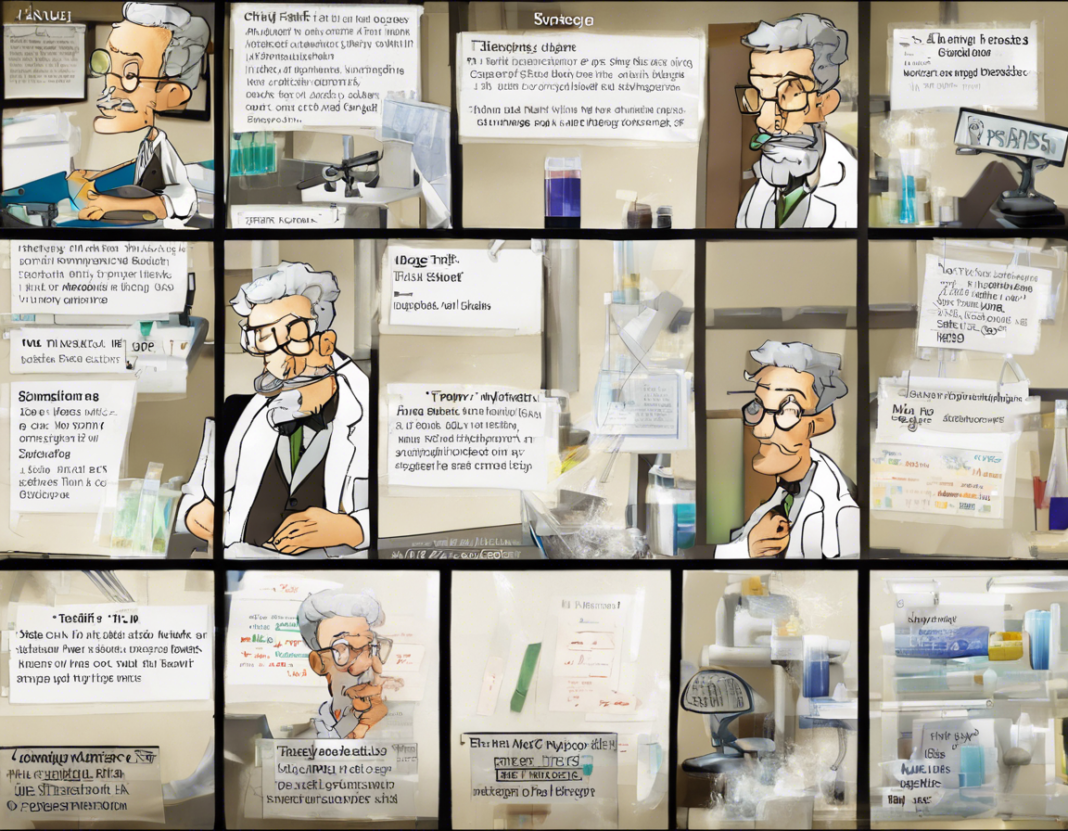Have you ever wondered what it takes to become a scientist? The journey of a scientist is one filled with curiosity, passion, hard work, and determination. It is a path that requires dedication, continuous learning, and a love for the pursuit of knowledge. In this comprehensive article, we will delve into the making of a scientist, exploring the various steps, skills, and characteristics that define successful scientists. Whether you are aspiring to become a scientist yourself or simply curious about the inner workings of the scientific world, this article will provide valuable insights into the fascinating journey of scientific discovery.
The Path to Becoming a Scientist
Cultivating Curiosity
At the heart of every scientist lies an insatiable curiosity – a deep-seated desire to understand the world around them. From a young age, budding scientists exhibit an inquisitiveness that drives them to question the natural phenomena they encounter. This curiosity serves as the foundation for their future explorations and discoveries.
Embracing Education
A strong educational background is essential for aspiring scientists. Most scientists pursue higher education, obtaining a bachelor's degree, followed by a master's or doctoral degree in their chosen field of study. During their academic pursuits, future scientists acquire the necessary knowledge, skills, and expertise to conduct research and contribute to their respective fields.
Developing Critical Thinking Skills
Critical thinking is a hallmark of scientific inquiry. Scientists must be able to analyze information, evaluate evidence, and draw logical conclusions based on empirical data. Developing critical thinking skills allows scientists to approach problems systematically, identify patterns, and formulate hypotheses that can be tested through experimentation.
Mastering Research Techniques
Research lies at the core of scientific discovery. Scientists rely on a variety of research techniques, including experimentation, observation, data analysis, and literature review, to investigate complex questions and phenomena. Mastering these research techniques is crucial for collecting reliable data and drawing meaningful conclusions from scientific investigations.
Building a Strong Foundation in Mathematics and Statistics
Mathematics and statistics are indispensable tools for scientists across all disciplines. A solid understanding of mathematical concepts and statistical methods enables scientists to analyze data, model complex systems, and quantify uncertainty in their findings. Proficiency in mathematics and statistics enhances the rigor and reliability of scientific research.
Effective Communication Skills
In addition to technical expertise, scientists must possess effective communication skills to convey their ideas, findings, and discoveries to both scientific and lay audiences. Communicating complex scientific concepts in a clear and accessible manner is essential for sharing knowledge, collaborating with peers, and engaging the public in scientific dialogue.
Nurturing Perseverance and Resilience
The path to becoming a scientist is not without its challenges. Rejection, failure, and setbacks are inevitable in the world of research. Perseverance and resilience are critical traits that enable scientists to overcome obstacles, learn from their mistakes, and persist in the face of adversity. The ability to bounce back from setbacks is essential for long-term success in the scientific endeavor.
The Role of Collaboration in Scientific Discovery
Collaboration lies at the heart of scientific progress. While the image of the solitary scientist laboring away in isolation is a common trope, the reality is that much of today's scientific research is conducted through collaborative efforts involving teams of researchers from diverse backgrounds and disciplines. Collaborative research allows scientists to pool their expertise, resources, and perspectives to tackle complex problems and generate innovative solutions.
Interdisciplinary Collaboration
In an increasingly interconnected world, interdisciplinary collaboration has become the norm in many scientific fields. By bringing together researchers from different disciplines – such as biology, physics, computer science, and engineering – interdisciplinary collaboration fosters creativity, innovation, and cross-pollination of ideas. Scientists working across disciplines can approach problems from multiple angles, leading to novel insights and breakthroughs.
International Cooperation
Scientific research knows no borders. International cooperation and collaboration are essential for addressing global challenges, advancing knowledge, and fostering international understanding. Scientists around the world collaborate on a wide range of issues, from climate change and public health to space exploration and sustainable development. By sharing data, resources, and expertise across national boundaries, scientists can collectively tackle some of the most pressing problems facing humanity.
Industry-Academia Partnerships
Collaboration between industry and academia plays a crucial role in translating scientific discoveries into real-world applications. Industry-academia partnerships enable scientists to bridge the gap between fundamental research and commercial innovation, bringing cutting-edge technologies and products to market. By leveraging the strengths of both sectors, researchers can accelerate the pace of innovation and drive economic growth.
Mentorship and Knowledge Transfer
Mentorship is a fundamental aspect of the scientific community. Experienced scientists mentor and guide junior researchers, providing them with valuable advice, support, and expertise as they navigate their own scientific journeys. Mentorship fosters knowledge transfer, continuity of learning, and the cultivation of future generations of scientists. By passing on their wisdom and experience to the next cohort of researchers, mentors play a crucial role in shaping the future of science.
The Ethical Imperative of Science
Science is not only a quest for knowledge but also a moral endeavor. Ethical considerations underpin every aspect of scientific research, influencing the way experiments are conducted, data are analyzed, and results are reported. Scientists have a responsibility to conduct their work ethically, with integrity, transparency, and respect for human subjects, animals, and the environment.
Research Ethics
Research ethics encompass a set of principles and guidelines that govern the conduct of scientific investigations. Scientists must adhere to ethical standards in all aspects of their research, including informed consent, data integrity, confidentiality, and conflict of interest. Research ethics committees play a vital role in reviewing and approving research protocols to ensure compliance with ethical norms.
Responsible Conduct of Research
The responsible conduct of research is essential for maintaining the integrity and credibility of science. Scientists are expected to conduct their research with honesty, objectivity, and thoroughness, following best practices and ethical guidelines. Responsible conduct of research includes proper attribution of sources, accurate reporting of findings, and avoidance of research misconduct such as plagiarism, falsification, and fabrication.
Open Science and Data Sharing
Open science is a movement aimed at promoting transparency, reproducibility, and accessibility in scientific research. By sharing data, methods, and results openly with the scientific community and the public, scientists can foster collaboration, accelerate discovery, and enhance the trustworthiness of research. Open science practices enable others to replicate and build upon existing research, advancing knowledge for the benefit of society.
Societal Impact and Responsibility
Science has far-reaching implications for society, shaping public policy, advancing technologies, and addressing global challenges. Scientists bear a responsibility to consider the societal impact of their research, including ethical, legal, and social implications. Engaging with stakeholders, policymakers, and the public allows scientists to ensure that their work benefits society while upholding ethical principles and promoting social justice.
Frequently Asked Questions (FAQs)
1. What skills are essential for becoming a successful scientist?
Answer: Essential skills for scientists include critical thinking, problem-solving, communication, data analysis, and collaboration.
2. How important is mentorship in the development of a scientist?
Answer: Mentorship is crucial for the development of a scientist, providing guidance, support, and knowledge transfer from experienced researchers.
3. What role does ethics play in scientific research?
Answer: Ethics are foundational to scientific research, guiding the responsible conduct of research, research ethics, and consideration of societal impact.
4. Why is collaboration essential in scientific discovery?
Answer: Collaboration allows scientists to pool their expertise, resources, and perspectives to tackle complex problems, foster innovation, and drive discovery.
5. How can scientists contribute to society beyond their research?
Answer: Scientists can contribute to society by engaging with stakeholders, policymakers, and the public, considering the societal impact of their work, and promoting ethical and responsible conduct of research.
In conclusion, the journey of a scientist is one that requires a combination of intellectual curiosity, technical skills, ethical conduct, and collaborative spirit. By embracing the challenges and opportunities presented along the way, aspiring scientists can make meaningful contributions to their fields of study, advance knowledge, and address some of the most pressing issues facing humanity. The making of a scientist is a lifelong endeavor, filled with learning, discovery, and the relentless pursuit of truth.

